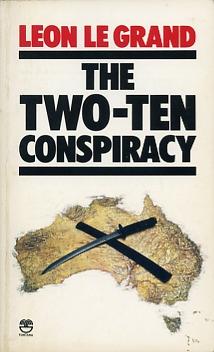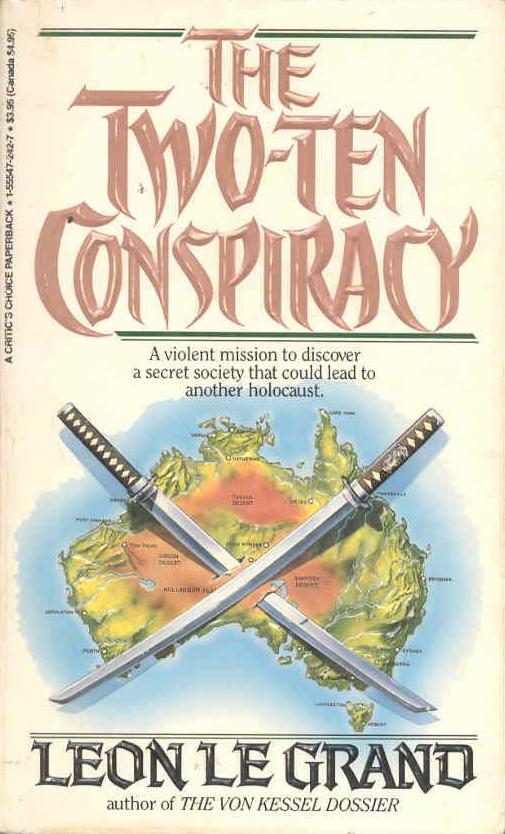The Two-Ten Conspiracy
The integration of South Japan and the old country
By William Wetherall
First posted 12 August 2008
Last updated 22 May 2010
|
Leon Le Grand
|
|
||||||||
|
The synopsis in the above box is from the back cover of the Australian Fontana/Collins edition. The cover of the US Lorevan Critic's Choice edition describes the story as a "Violent mission to discover a secret society that could lead to another holocaust." "futatsu-too kai"The Two-Ten Conspiracy mixes a tale of alternative historical romance with a tale of alternative future war -- undertaken by a secret society that has sworn to complete an ancient mission to build a Japanese nation on what, after its "discovery" and "claim" by Japan, became Australia. The plot is partly about avenging Japan's loss in World War II, and partly about civilizing a world that continues to be at the mercy of a not very merciful white peril. The author deploys the usual arsenal of sexual and racial stereotypes to advance what is actually an interesting plot in what could be called a fantasy thriller. The president of the United States tells Berresford what he knows of the 'futatsu-too kai' -- the 'two-ten society' (page 178). Berresford is assigned the mission of penetrating the society, which is thought to be behind the assassination of over forty of America's best intelligence agents. And something -- the president does not know what -- is supposed to happen on the fifth of February, 1997. Berresford has conditions. He wants "a retired CIA friend of mine, Tom Brady, a negro guy" to help him. The president's men also have their conditions -- Berresford must accept the help of an assistant named Arna Kumura -- who wore perfume with a delicate fragrance and had a soft, melodious voice (page 183).
Of course Michael and Arna are attracted to each other, and of course she has a mission of her -- which includes convincing Michael that the imbalances of the world are wrong -- imbalances such as those between Japan -- where "hundreds of thousands of foetuses . . . have been aborted because there is no room for large families" -- and Australia -- where "one man . . . can own land which could support thousands of people" (pate 254). "every right to take Australia"By the end of the story, Berresford is trying to convince the president that Japan's demands are justifiable (pages 296-297).
Berresford informs the president that Japan also has a disarmament -- and "the disarmament includes Russia and the States." The president cannot believe that Japan thinks itself a world power, but Berresford assures him that "'In many ways they're more powerful than Russia and the United States, and maybe their influence could defuse some of the current international problems'" (page 298). "You've got to give it to them"There is a war, and the "death toll was five thousand less than Japan suffered in the American bombing of Nagasaki and Hiroshima" -- involving Australia's defence forces and two major cities (page 315). As a result, "the integration of South Japan and the old country" are successful (page 314). These remarks, and the following among many others, come in Chapter 38, the Epilogue, consisting of a dialogue between Michael Berresford and Tom Brady, in which Brady asks the questions that Berresford needs to answer to explain the aftermath of two-ten operation and wrap up the lose ends (pages 313-318).
Among the many details I have not spoiled here is the relationship between Michael and Arna. The last sentence of the novel, though, is "'Sayonara my love,' he whispered.". Why the author has chosen to write such a novel can only be guessed from the manner in which it ends -- somewhat on the side of Japan's mission to rid the world of the white peril and its excesses in Asia, including Australia. As portrayed in this novel, Australia -- vulnerable to exploitation, corruption, and conquest -- could be seen as Korea, and Manchuria and even China, by the end of the 19th and start of the 20th centuries, when Japan's embarked on missions to both rescue and develop them in the name of co-prosperity. Leon Le Grand expresses his understanding of the dynamics of Japanese history in one-page Preface.
Fictitious, perhaps, except that Michael Berresford -- the "young charismatic American" hero -- appears to be a projection of the author, who is described on the front fly leaf of the Australian edition like this.
The Von Kessel Dossier (Sydney: Fontana/Collins, 1985, 305 pages) also features "Michael Berresford, a young successful American businessman, heads an oil exploration company in Australia. He is tricked by an English shareholder into a situation of murder and deceit."
Le Grand (b1940) wrote a third novel, The Whittington Pact (Sydney: Collins Australia, 1988, 194 pages), the plot of which I am unable to confirm. He then "underwent a major spiritual conversion and turned his attention to writing and producing religious films" -- according to AustLit, "a non-profit collaboration between twelve Australian Universities and the National Library of Australia providing authoritative information on hundreds of thousands of creative and critical Australian literature works relating to more than 100,000 Australian authors and literary organisations." I would guess, therefore, that Le Grand is an Australian -- possibly once an American -- who has tried, but failed, to create an endearing and enduring American hero -- an alien who has invested much of his life in Australia -- loves the country -- and is willing to risk his life to save it from itself -- and has considerably admiration for Japan and Japanese capability. Otherwise one would have to read The Two-Ten Conspiracy as a tongue-in-cheek yellow-peril thriller. |
|||||||||

